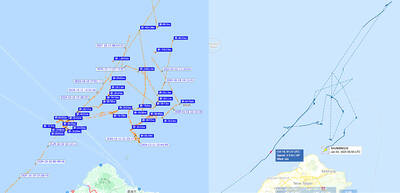A small scientific satellite jointly developed by National Central University (NCU) and institutions in the US, India and Singapore is to be launched in August, an NCU professor said yesterday.
The INSPIRESat-1 microsatellite, which weighs about 8.6kg, was developed under the International Satellite Program in Research and Education (INSPIRE) — a consortium of universities with space science departments.
The consortium is spearheaded by the Laboratory for Atmospheric and Space Physics at the University of Colorado Boulder and it also involves the Indian Institute of Space Science and Technology, Nanyang Technological University of Singapore and NCU, among other participants.
The satellite is to be launched by India’s Polar Satellite Launch Vehicle on a rideshare mission in August, NCU Department of Space Science and Engineering professor Loren Chang (張起維) said.
As the launch also includes an Indian synthetic aperture radar imaging satellite, the cost is being covered by the Indian Space Research Organization, Chang said, adding that the mission has been delayed from last year due to the COVID-19 pandemic.
Taiwan and India do not officially cooperate in space technology, and all of the satellites developed by Taiwan over the past three decades have been launched by US rocket suppliers.
Collaborating with the Indian institute has been a success and the department is mulling signing a cooperation agreement with the institute, Chang said.
After the university consortium was established in 2015, participants held their first meeting in 2016 at NCU and set up the INSPIRESat-1 mission, he said.
Subsequently, students at the department regularly visited the University of Colorado Boulder to help build the satellite and receive training, he added.
The microsatellite carries a Compact Ionospheric Probe (CIP) developed by NCU for studying the Earth’s dynamic ionosphere, according to a paper authored by Chang and other participants in the project in the journal Advances in Space Research.
The CIP is a miniaturized version of the Advanced Ionospheric Probe developed by department director Chao Chi-kuang (趙吉光), which is operating onboard Taiwan’s Formosat-5, which was launched in 2017.
The other instrument carried by the INSPIRESat-1 is a Dual-zone Aperture X-ray Solar Spectrometer developed by the University of Colorado Boulder for studying highly variable solar X-ray radiation, the paper says.
The microsatellite is to be deployed into a sun-synchronous orbit at an altitude of about 525km, and has a designed mission life of one year and a primary minimum requirement of six months for science operations, it says.
In addition to INSPIRESat-1, NCU is also collaborating on INSPIRESat-6, which is a remote sensing satellite using hyperspectral techniques, Chang said.

A strong continental cold air mass and abundant moisture bringing snow to mountains 3,000m and higher over the past few days are a reminder that more than 60 years ago Taiwan had an outdoor ski resort that gradually disappeared in part due to climate change. On Oct. 24, 2021, the National Development Council posted a series of photographs on Facebook recounting the days when Taiwan had a ski resort on Hehuanshan (合歡山) in Nantou County. More than 60 years ago, when developing a branch of the Central Cross-Island Highway, the government discovered that Hehuanshan, with an elevation of more than 3,100m,

Death row inmate Huang Lin-kai (黃麟凱), who was convicted for the double murder of his former girlfriend and her mother, is to be executed at the Taipei Detention Center tonight, the Ministry of Justice announced. Huang, who was a military conscript at the time, was convicted for the rape and murder of his ex-girlfriend, surnamed Wang (王), and the murder of her mother, after breaking into their home on Oct. 1, 2013. Prosecutors cited anger over the breakup and a dispute about money as the motives behind the double homicide. This is the first time that Minister of Justice Cheng Ming-chien (鄭銘謙) has

SECURITY: To protect the nation’s Internet cables, the navy should use buoys marking waters within 50m of them as a restricted zone, a former navy squadron commander said A Chinese cargo ship repeatedly intruded into Taiwan’s contiguous and sovereign waters for three months before allegedly damaging an undersea Internet cable off Kaohsiung, a Liberty Times (sister paper of the Taipei Times) investigation revealed. Using publicly available information, the Liberty Times was able to reconstruct the Shunxing-39’s movements near Taiwan since Double Ten National Day last year. Taiwanese officials did not respond to the freighter’s intrusions until Friday last week, when the ship, registered in Cameroon and Tanzania, turned off its automatic identification system shortly before damage was inflicted to a key cable linking Taiwan to the rest of

TRANSPORT CONVENIENCE: The new ticket gates would accept a variety of mobile payment methods, and buses would be installed with QR code readers for ease of use New ticketing gates for the Taipei metro system are expected to begin service in October, allowing users to swipe with cellphones and select credit cards partnered with Taipei Rapid Transit Corp (TRTC), the company said on Tuesday. TRTC said its gates in use are experiencing difficulty due to their age, as they were first installed in 2007. Maintenance is increasingly expensive and challenging as the manufacturing of components is halted or becoming harder to find, the company said. Currently, the gates only accept EasyCard, iPass and electronic icash tickets, or one-time-use tickets purchased at kiosks, the company said. Since 2023, the company said it